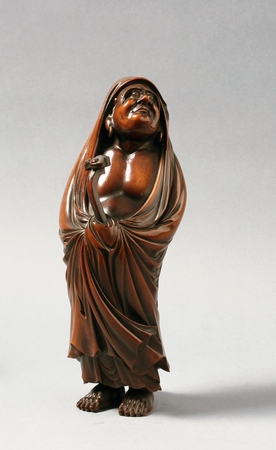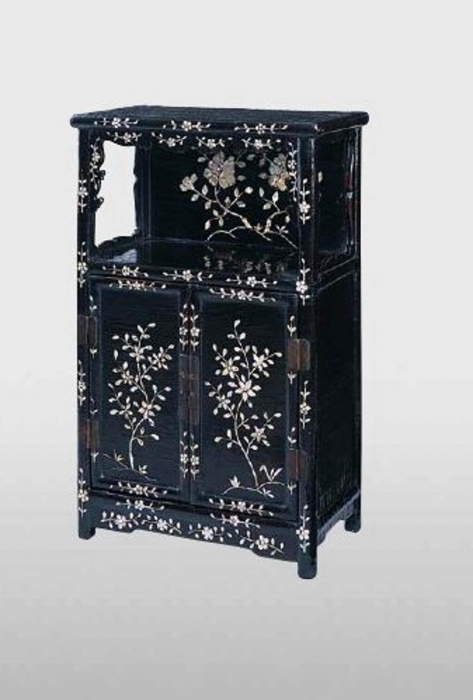Product Description
5945 A boxwood okimono (decorative object) of Daruma. The figure stands wrapped in a kesa (priest’s robe) and holding a nyoi (priest’s staff).
Signed: Hōkyū-dō Masayoshi-tō (Carved by Masayoshi, Hōkyū-dō)
Japan 19th century Edo period
Dimensions: H. 11¼” (28.5cm)
Tomobako (Wood box) inscribed on the cover:
Daruma Taishi kan daizo (a large figure of holy Daruma)
An inscription inside the cover reads:
I, (Itō Kinbei) purchased this figure in March of Meiji 43, (1901) in the year of Kanoe-inu. This work was produced about one-hundred years ago. Private collection of Itō Kinbei: address – 4-chome, Benten Street, Yokohama.
A further paper label on the box reads: This is to certify that this is an authentic work by Masayoshi, certified by the Tokyo Bijutsu Shinko-kai Association
There is some original paperwork accompanying this piece, it is an official document used to register a tangible object for collateral. The form is not filled in. It appears that the form was printed for Solicitors’ use by the main Magistrate in Niigata Prefecture, during the Showa period.
Chomei Masayoshi (1802-1848). He was born in Takada, Echigo province (modern Niigata prefecture), northern Japan, his given name was Yaokichi Ishikura. From an early age Masayoshi excelled at carving many types of objects including netsuke and was particularly well known for his carvings of Shi Shi (lion dogs).
Daruma is the Sage who founded the Zen sect of Buddhism in China. He is said to have retired to Lo Yang in the year 520 AD where he remained seated, absorbed in meditation for nine years, during which temptations were heaped upon him by evil spirits without any result. At the end of that period his legs were said to have atrophied and he is often depicted as entirely enveloped in his robes, shaped like a bag, from which his swarthy scowling face emerges. A popular Japanese toy is a round – based Daruma doll which cannot be knocked over giving a light hearted illustration of the philosophy of perseverance. “Seven times down eight times up.”
Having once been tempted by sleep he cut off his eyelids as a penance and tossed them aside, where the lids landed on the ground the tea plant is said to have grown, to this day Zen monks drink tea to ward off sleep.









